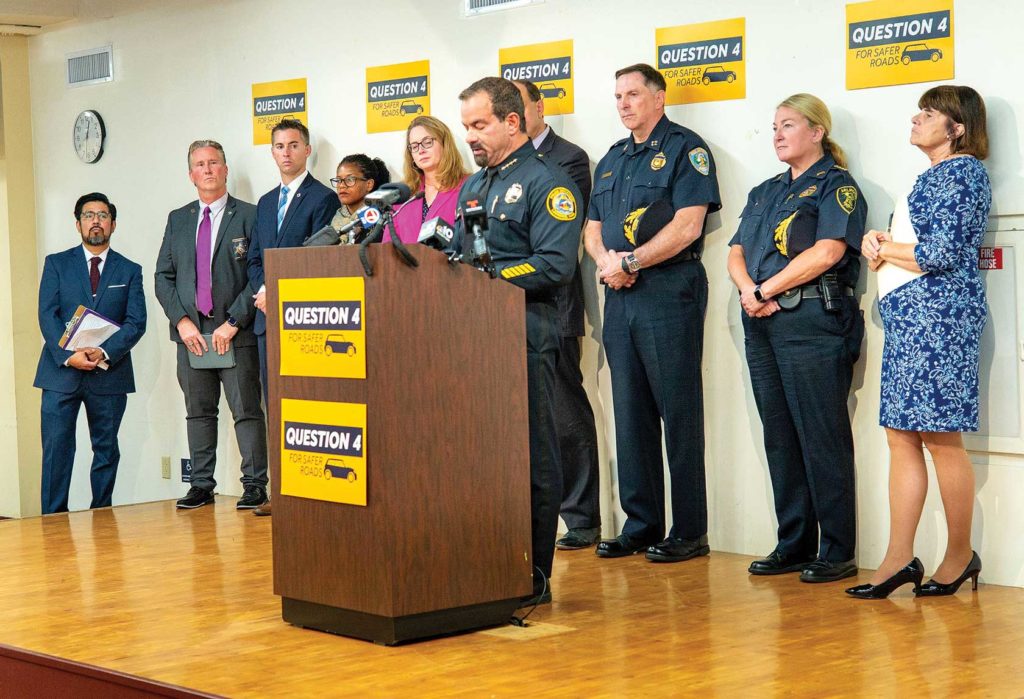
With the statewide election just weeks away, proponents of a new law that would give undocumented immigrants driver’s licenses continue to campaign on claims that the provision will make Massachusetts roads safer.
Last Wednesday, law enforcement leaders from across the state came together at the 32BJ Service Employees International United (SEIU) union hall in Boston to voice support for the law and urge voters to choose ‘Yes’ on ballot question 4. The ballot question gives voters a choice to either preserve the law with an affirmative vote, or strike it down by voting ‘No.’
“This law increases the number of drivers being properly trained, tested and insured, and I am proud to urge voters to support it with a Yes vote,” said Middlesex District Attorney Marian Ryan.
In June, the law was initially passed by Democratic senators, who voted 32-8 to override a veto by Republican Governor Charlie Baker. Dubbed the Work and Family Mobility Act, the new law would provide the opportunity for legal licenses to operate a motor vehicle, while removing the fear of deportation.
As such, the law would not allow the Registry of Motor Vehicles to keep documentation related to immigration status. Immigrants would be required to pass a road test and would have to provide legal documentation from a foreign government identifying themselves.
In response to its passage, critics devised the ballot question in hopes of stopping the practice before it begins. Question 4 is the result of a months-long GOP-backed campaign by the Fair and Secure Massachusetts Coalition, which was tasked with gathering more than 40,000 signatures to get the question in front of voters.
The group has been led in part by Maureen Maloney, who said she has taken up the crusade after her son was killed in 2011 by a drunk driver who lacked legal immigration status.
Maloney, recruited to be the face of the movement by conservative gubernatorial candidate Geoff Diehl, says the law undermines the sanctity of U.S. laws and opens the door for voter fraud. In a commentary piece written for the Berkshire Eagle, Maloney argues that firstly, the Registry of Motor Vehicles would not have the capacity to know what other countries’ identifying documents look like well enough to make a judgement on their legitimacy.
She argues that the law would contradict the Real ID law, which was “originally passed at the recommendation of the 9/11 Commission, due to the fact that the 19 hijackers had more than 30 different state-issued IDs on their person at the time of the attack, none of which provided their actual identities.”
Maloney goes on to say that secondly, it would be nearly impossible for election workers to distinguish between a “driver’s license issued to someone with lawful presence in the country and someone here illegally,” leading to illegal ballot-casting.
Supporters of the law continue to reassure Massachusetts voters that the new licenses would not automatically register people to vote, as is standard for residents with legal immigration status, and that election officials would be well equipped with resources to tell the difference between the traditional and new licenses.
Additionally, proponents have pointed to the successes of other states that already have similar laws on their books.
“This law has to do with improving road safety for everyone by allowing immigrants without status to follow our state motor vehicle laws, just like they do in Connecticut, New York, Vermont and 13 other states,” said Roy Vasque, president of the Massachusetts Major City Chiefs of Police Association.
Vasque said that he and his colleagues believe that the law discourages hit-and-runs and promotes safer driving practices as well.
“It makes my life simpler, as well, because I know that when one of our police officers needs to stop a driver, there’s an increased likelihood the driver will have a proper form of identification, they’ll have auto insurance, and they won’t panic about a simple traffic incident,” he said.
Vasque and other supporters have repeatedly cited data that shows several states having drops in hit-and-run accidents, and states like New Mexico and Utah having measured drops in uninsured driving.
Hundreds of thousands of undocumented immigrants live in Massachusetts. If the law survives the November vote, many of those could apply for licenses as soon as next summer.






